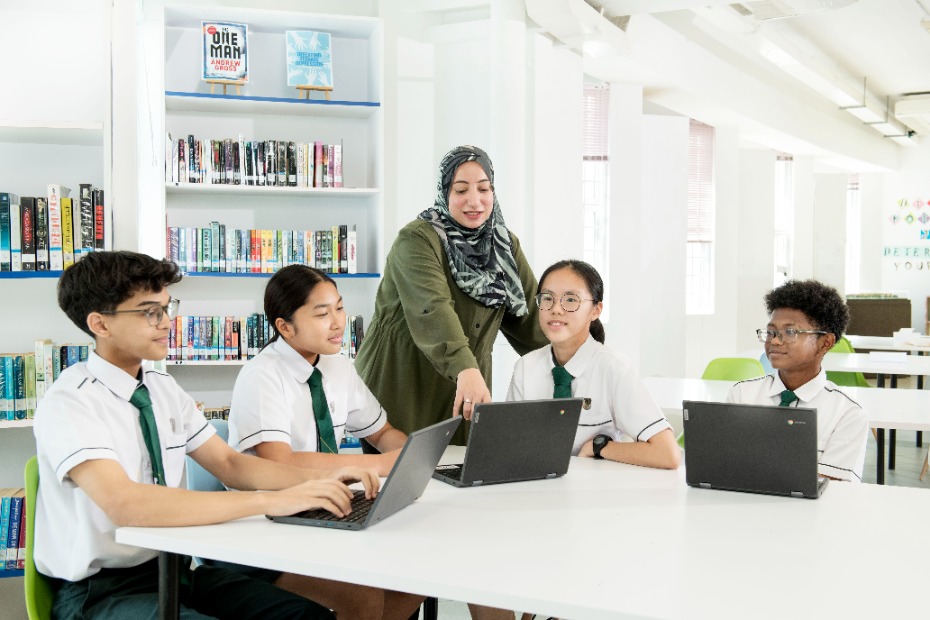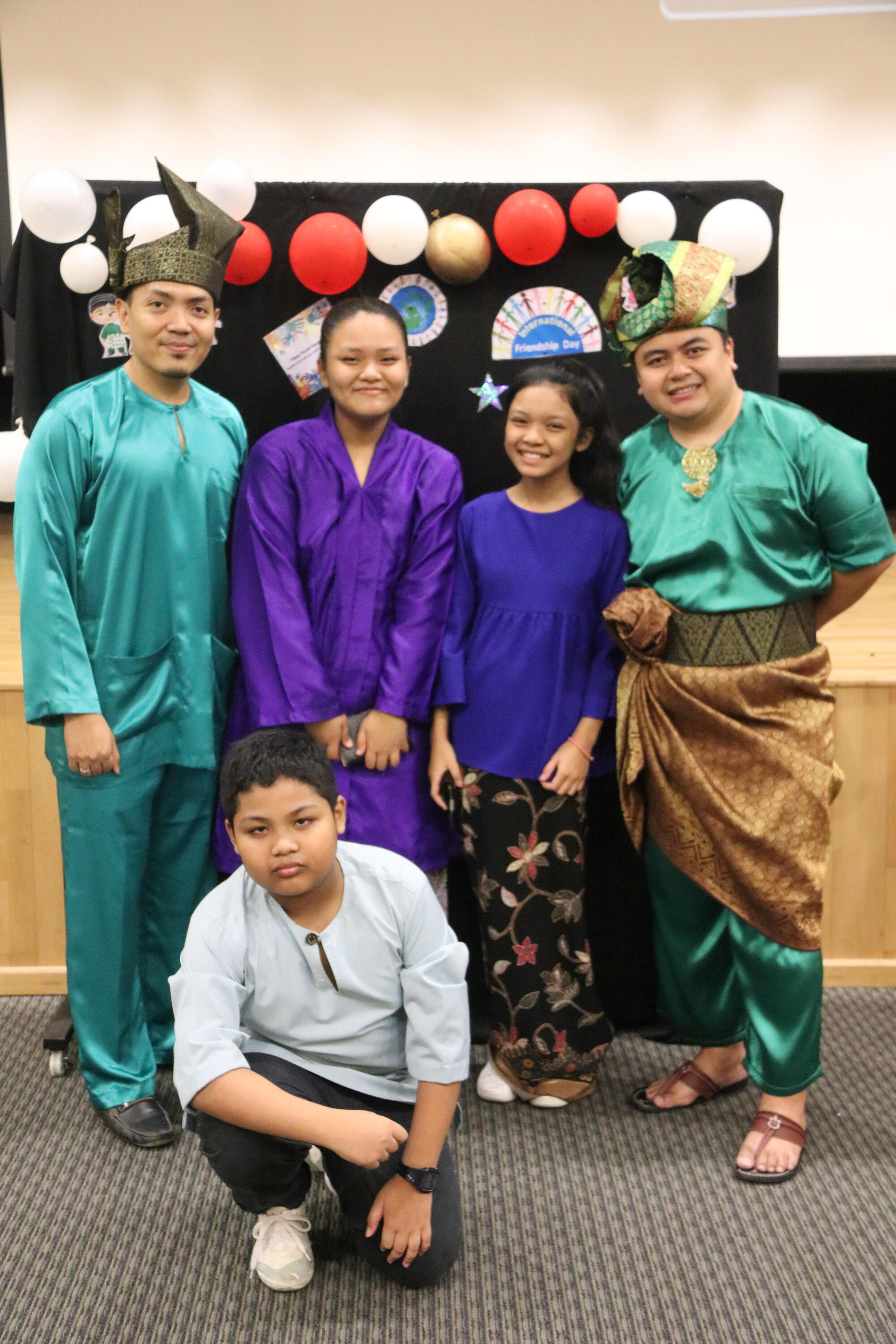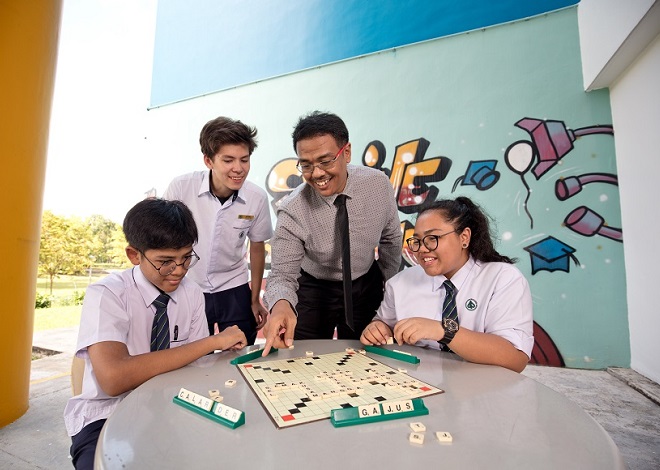Multimedia and Games Galore in Mother Tongue Lessons
20 Apr 2010

At Yio Chu Kang Primary School, pupils beef up on their Tamil vocabulary via a board game called ‘Kolangal’.
Think you can get away with reading comics in class?
In Mdm Hazliana Mahat’s lessons, you certainly can! In fact, this Malay Language teacher from Fengshan Primary School wants her students to go one step further and hone their composition skills by creating their own comics using a programme called Comic Life.
As more and more students use English in school and at home, many are finding elements of their Mother Tongue lessons unfamiliar and challenging. Thus, Mother Tongue teachers such as Mdm Hazliana are turning to new media tools such as blogs, podcasts, comics and games to make lessons more engaging and relevant to today’s Internet-savvy youngsters.
Using multimedia in Malay Language lessons
“Before Comic Life, composition lessons have always been dry and boring to students. The thought of having to write 150 words really killed their enthusiasm to even try to write,” recalls Mdm Hazliana. “But using Comic Life helps students to articulate their ideas and construct a logical story flow by arranging sequential images and text to tell a story.”
Her colleague, Mdm Hafidah Mahat, prefers to use IT tools such as blogging and podcasting in her Malay Language classes. Through blog entries, the students pen their reflections on topics such as Singapore’s war heroes. As they read and comment on each other’s blog posts, the students get to see how their classmates think about the same subject and respond with their own opinions. Mdm Hafidah’s class has even written a Wikipedia entry on aliens!
“Blogging and penning our thoughts in paper are two different things,” says Ahmad Fudoel from 5A. “When you blog, you tend to reflect better as it is personalised and we can upload our own pictures to insert into our blogs.”
While blogs and Comic Life motivate the students to write better, both Mdm Hazliana and Mdm Hafidah use podcasting to help students improve on their oral fluency. It doesn’t hurt that making their own podcasts channels the students’ inner disc jockeys!
“I love doing Audacity podcasts as I am able to record and hear my voice,” exclaims Nur Sarah from 4H. “I am also able to assess my friend’s reading with the rubrics given.” Using the Audacity software, students record their reading of a passage, saving the files in a shared folder for self-directed and peer assessments as well as evaluations by Mdm Hafidah and Mdm Hazliana. “I see wide grins and sense the eagerness to get started when we do podcast lessons,” shares Mdm Hafidah.
Board game a draw for Tamil Language students
Over at Yio Chu Kang Primary, Ms Mageswari Kanapathy sees the same eagerness in her students during Tamil Language classes when she brings out the board game ‘Kolangal’.
“Kolangal is a colourful design made from coloured flour or rice, done on the floor for special occasions. It is a form of charity-giving of food and it attracts small critters like ants and birds,” she explains. “For same reason, just like Kolangal attracts these animals, we want to draw the students in to love the Tamil Language through the game.”
In ‘Kolangal’, each player is given a sum of tokens which will grow if he or she can answer the questions on the cards drawn. With more money, the players can buy land and build homes. But if the student is unfortunate enough to draw a card from the jail category and get the answer wrong, he or she will have to pay a fine to the bank.
Interactivity is the name of the game, which encourages students to learn and practice their language skills in a non-threatening environment. As they play, students not only practice the Tamil Language, they also gain ‘soft’ skills such as peer bonding and resource management, as they have to learn to juggle their tokens and ‘purchases’ wisely.
More than just a game
If ‘Kolangal’ reminds you of Monopoly, it is because Ms Mageswari had an epiphany while paying the classic board game with a nephew. “I remembered thinking, why not create something for Tamil Language based on this?” she recounts. “Later, I sat down and designed the whole game incorporating the syllabus.”

Digital tools and social media help Mdm Hazliana (right) and Mdm Hafidah share the fun of learning Malay Language.
With two fellow teachers, Ms Mageswari weaved 1,100 questions encompassing grammar, proverbs, general knowledge and National Education into the game, which was customised to meet pupils’ varying needs and abilities. Created entirely by the Tamil Language department in Yio Chu Kang Primary School, ‘Kolangal’ had since won 5 awards.
Ms Mageswari, Mdm Hazliana and Mdm Hafidah will still cringe each time they come across bad grammar or inaccurately expressed proverbs. But ultimately, what they value most is seeding a love for their respective Mother Tongue languages in their students. And who can quibble when doing so through games and social media tools comes with the added bonus of boosting peer interaction and mutual confidence?





.jpg)

.jpg)